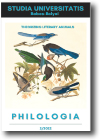A FORMAÇÃO DE PROFESSORES DE PORTUGUÊS E OS DESAFIOS DA AULA EM TEMPOS DE COVID-19
THE PORTUGUESE LANGUAGE TEACHERS TRAINING AND THE CHALLENGES OF THE CLASSROOM IN TIMES OF COVID-19
Author(s): Eulália Leurquin, Maria João MarçaloSubject(s): Foreign languages learning, Adult Education, Higher Education , Health and medicine and law, Distance learning / e-learning
Published by: Studia Universitatis Babes-Bolyai
Keywords: initial teacher training; classroom challenges; Portuguese as mother tongue; on-line classes; Covid-19 times;
Summary/Abstract: The Portuguese Language Teachers Training and the Challenges of the Classroom in Times of Covid-19. The trainee teacher must be aware that his/her practice involves observation skills, critical thinking and actions’ reorganization. We add to this position the fact that the Letters intern must be trained with the profile of a professor-researcher, aware of his/her role in society. Our main objective in this article is to discuss the initial training of mother tongue teachers in a pandemic context. That also involves preparation to go on remote classes if an emergency situation is decreed by the government. The goal of the data generation device was to become aware of the challenges interns and pre-service teachers experience when confronted with remote classes, considering that many just started teaching. Having in mind the objective above-mentioned we came up with five research questions: (a) Before the internship, did you already have experience in teaching Portuguese language? (b) Does the university, in pre-service training, enable the future teacher to use technology in Portuguese-speaking classroom? (c) What are the main challenges you faced during the internship? (d) How does didactic interaction take place in the internship classroom in times of a pandemic? (e) What are the advantages of remote class in an emergency situation? All this context is challenging concepts such as “didactic interaction”, “teaching and learning”, “teacher training” and “teacher action” and, besides, it also forces us to rethink the model of teacher training that we still have today.
Journal: Studia Universitatis Babes-Bolyai - Philologia
- Issue Year: 67/2022
- Issue No: 2
- Page Range: 347-360
- Page Count: 14
- Language: Portuguese

